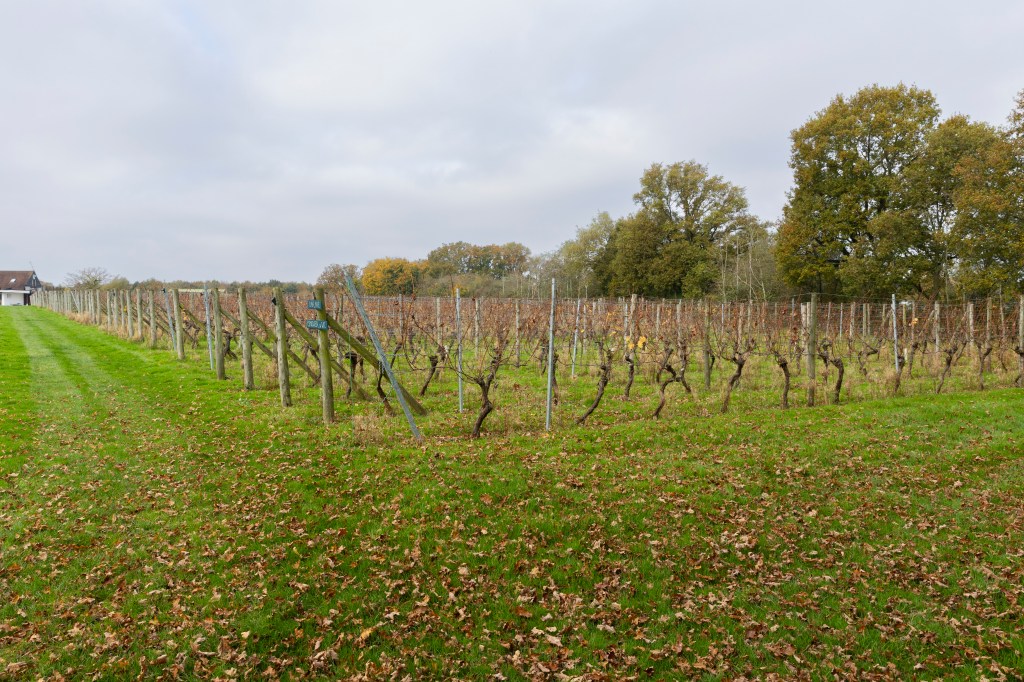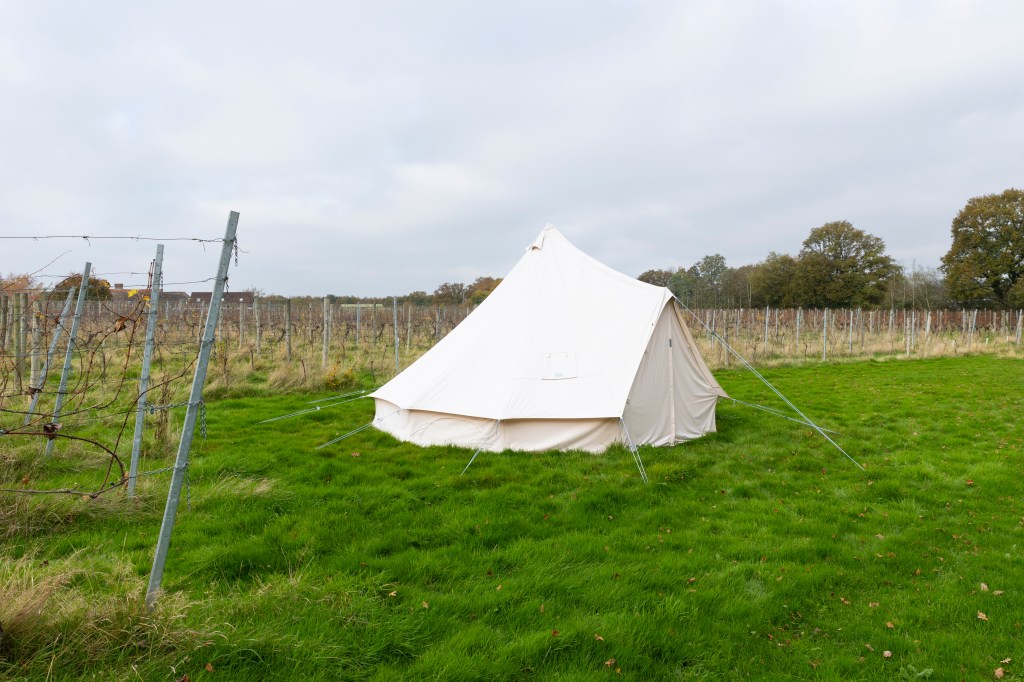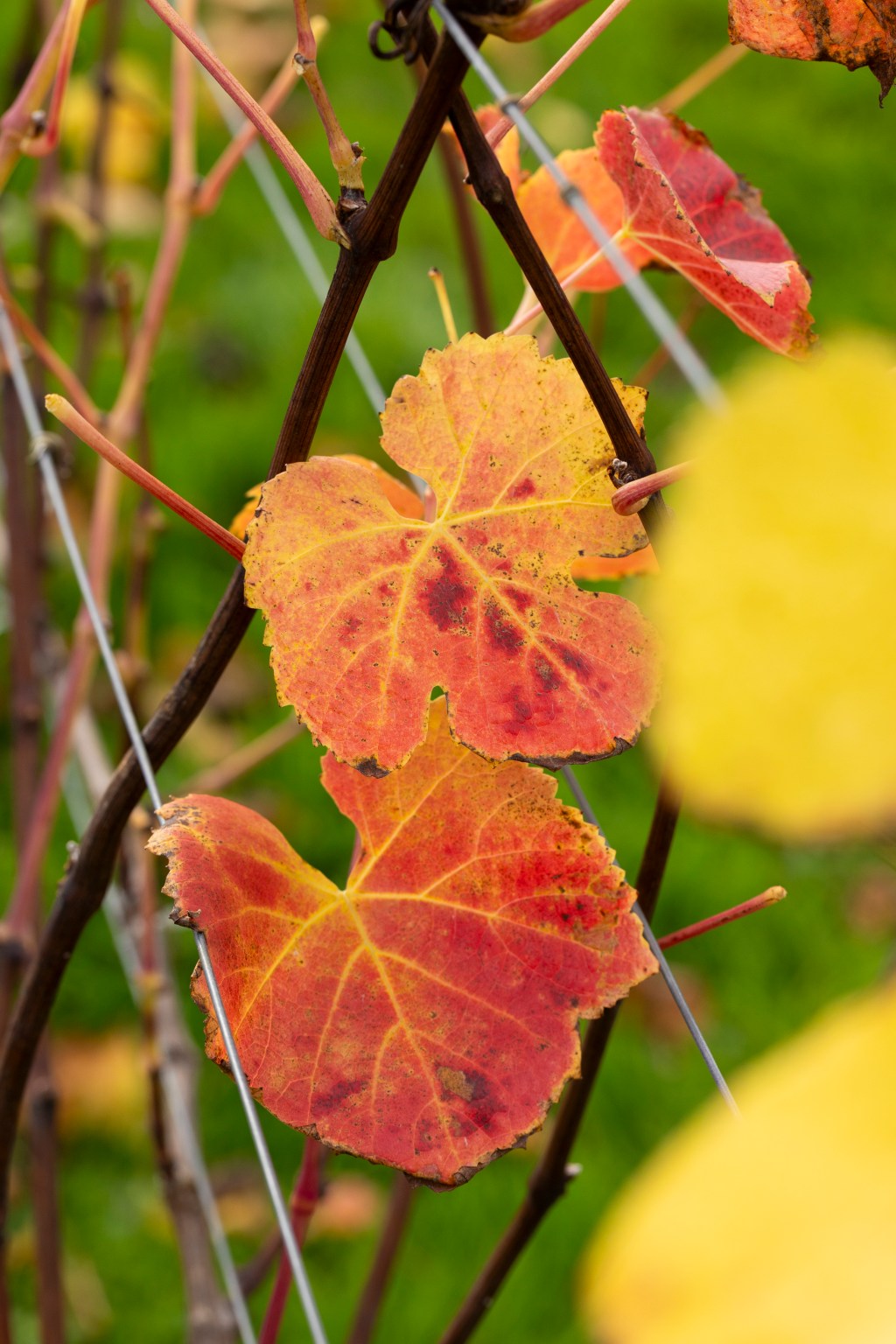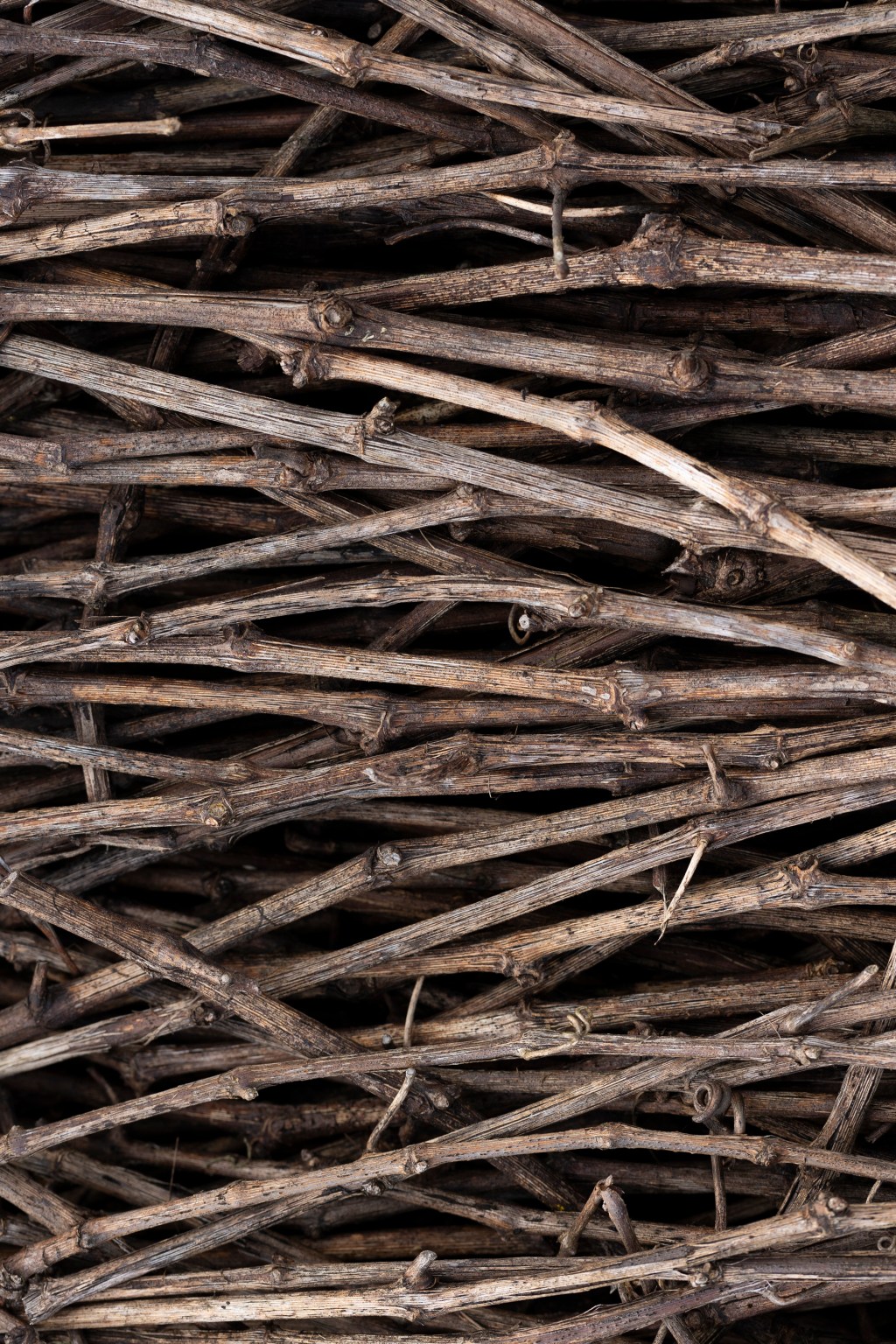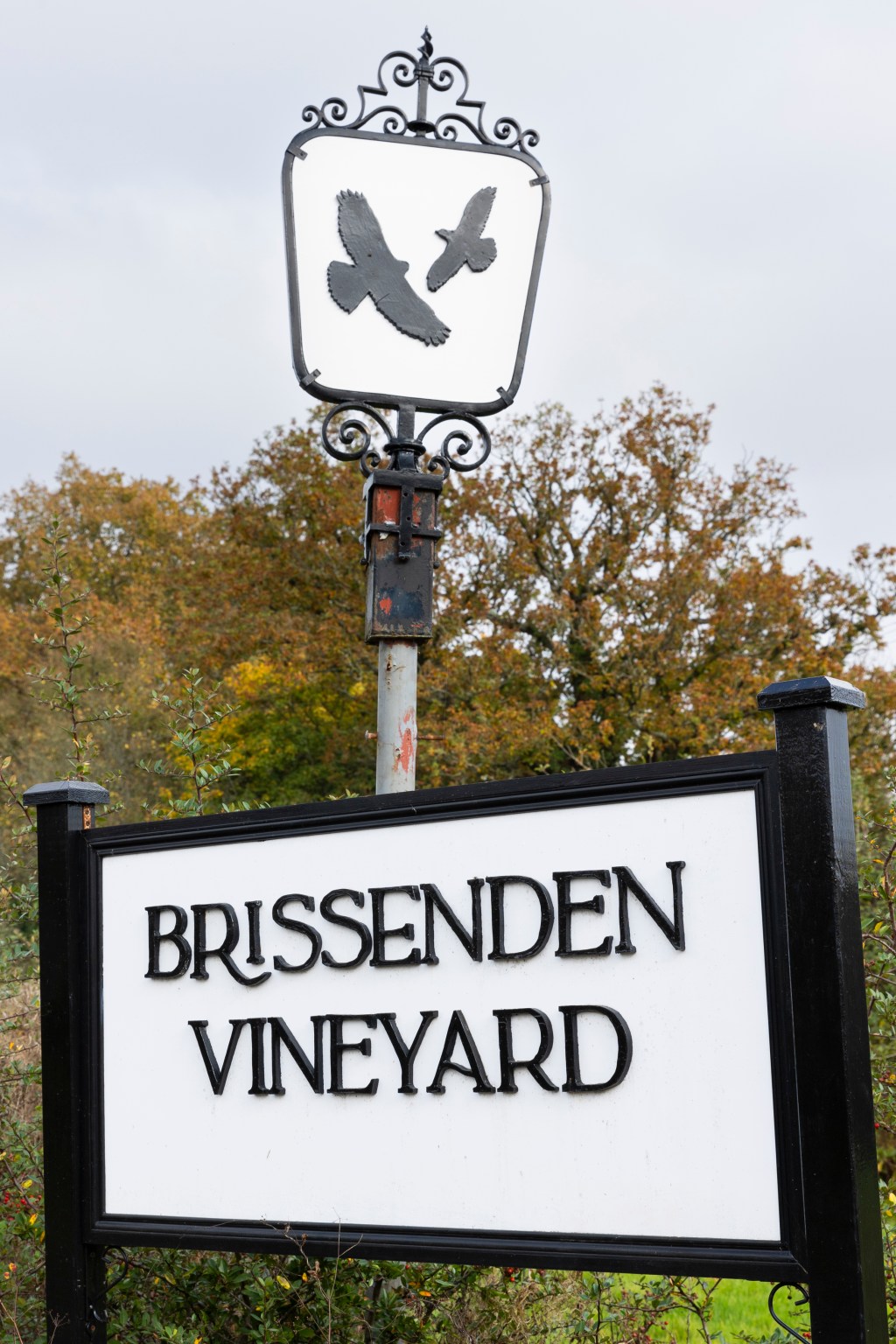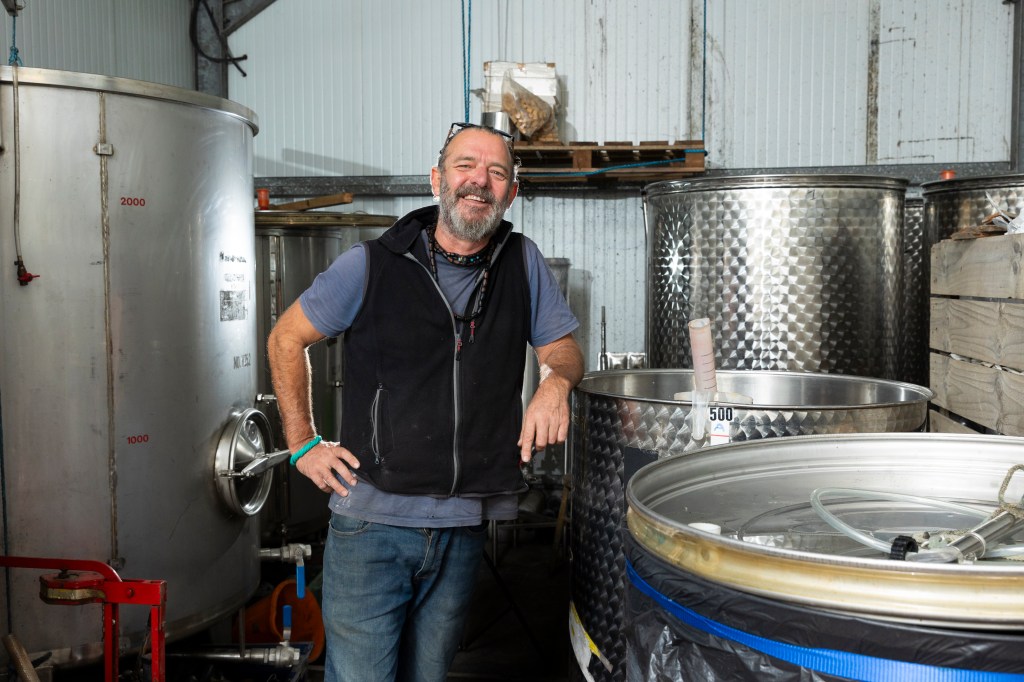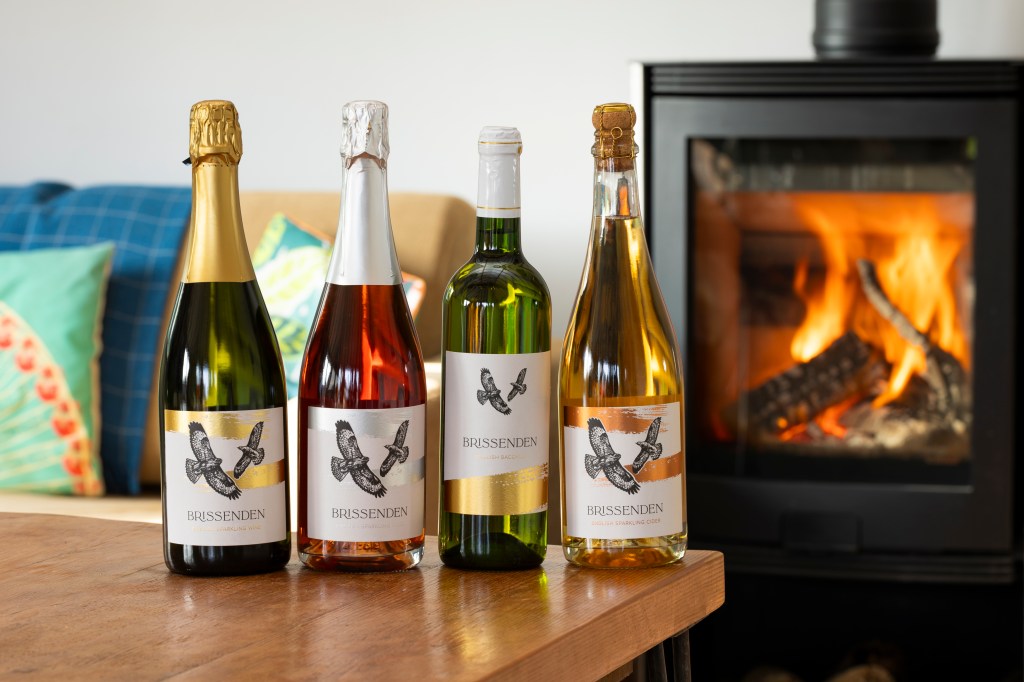There are seven acres of vines on the ten acre site that were originally planted by David Rackham in the 1980’s. Clare and Gordon have been in possession of the vineyard for seven years and now have old vines with a charm and character that is uncommon. This can have its drawbacks as well as its benefits, “All the old vines have been planted by hand and so the rows lack the precision that many newly planted vineyards will achieve. This has meant that we have had to experiment to find the right equipment for certain vineyard tasks such as undervine weed management,” said Clare.
The vineyard also has an onsite winery where the wines are made under the Brissenden label. At first glance a small vineyard with old vines and its own onsite winery may seem like a remarkable and unusual story and yet there are far more remarkable things to discover at Brissenden Vineyard.
The story quickly shifts to the core team at Brissenden which includes Emma Sparkes and Jess Brogan. The camaraderie between members of the team is evident from the first moment and the close working relationship feels so natural as Clare, Emma and Jess talk about the vines, each other and life.
Clare and Jess had been at school together after Clare moved back to Kent the two reconnected at a charity fun run discovering that they had children of similar ages whilst Emma and Clare met seven years ago at the pre school nursery that their children attended. “Mums at the school gate are an untapped resource for vineyards because they can offer such an amazing set of skills and vineyards are able to offer friendly working hours,” said Clare as she explained that one year at harvest she had hired a bouncy castle to keep the children entertained whilst the mums were hand harvesting the vineyard.
Clare who has three children asked Emma if she would like to work on the vineyard in the hours between dropping the children off at school and picking them up in the afternoon. “Emma would leave her car at the school and I would drive us both back here, we would work in the vineyard and then I would drop her back at the school gates in time to collect our children,” said Clare. “I had forgotten that once I left my car at the school, I literally had no escape,” said Emma with a twinkle in her eye, the joke making everyone laugh.
This highlighted that the atmosphere at Brissenden is one of enjoyment and putting that into words Clare said: “For Seven years I have never dreaded a Monday,” Emma and Jess looking at her with an unspoken understanding.
The vineyard was originally planted with Reichensteiner, Bacchus and Pinot Noir and Clare and Gordon made the decision to remove some of the original Reichensteiner vines to make way for Chardonnay. Each year at least 20 tonnes of fruit are sold and a few tonnes are kept for making their own wines.
”Initially the Reichensteiner had not been that well cared for and needed a really hard prune,” explained Clare and she attributes this to the variety falling out of favour with both the wine community and the public. Clare was pleased that the old gnarly looking vines survived the hard pruning and that the reputation of this grape variety seems to be on the rise again. “The two harvests of 2022 and 2023 were very good for Reichensteiner, I love these vines the bunches are open and hang low and they are easy to pick, just before harvest it always brings to my mind the hanging gardens of Babylon,” added Clare with pride. Brissenden have plans to use the Reichensteiner for a small release of sparkling and still wines in the future.
Everything on the vineyard is a team effort and this includes pruning. Jess and Clare both look at Emma and declare that she has a natural affinity with pruning. “She just seems to be able to look at the vine and instinctively know which two canes should be chosen,” said Jess. Emma’s enthusiasm for the task of pruning leads to a long discussion about the WineGB Pruning Competition and what is involved. (I secretly think Emma may spend the next few months convincing Jess and Clare to join her in the team event).
The 2024 season has been hard but the team agree that despite a lower yield the fruit has all come in clean. “Our agronomist is Andy Bull from Hutchinsons and he is always ready to answer any questions we might have even though we are a really small vineyard. He always replies to an email,” said Clare with appreciation in her voice. “He is also really calm it doesn’t matter what problem we might face him with he gives us confidence that it can be sorted,” added Jess. There are other companies that have been really supportive. “Recently I phoned Vigo about a foiling machine that was not working the same way as last year and they were willing to talk me through what was wrong over the phone,” said Jess. Owen and Fergus Elias have been very supportive on the winemaking side and Owen Elias has been really impressed by the quality of fruit from the old Pinot Noir vines although the exact clones of these vines is unknown. It is assumed they are German clones based on the planting date of the 1980’s and the Reichensteiner that was planted at the same time, but the scientific detail has been lost in time adding significantly to their charm. It is this block that holds a special place in Gordon’s heart.
The site at Brissenden is not particularly prone to frost and due to the small size of the vineyard frost prevention methods are not really being considered at the moment. “I have read so much around the subject of frost,” said Clare and she demonstrates her in depth knowledge of the subject discussing the risks of radiation frost versus advection frost. “We are so small I am not convinced that we can implement anything that would be cost effective and efficient,” she continued. Clare recounted a story regarding frost: “One year I did try lighting fires and in the beginning the children thought it was fun but then the novelty wore off and I was left on my own in the vineyard in the dark, lighting the last fire and the benefit was only seen in the first few bays.”
Being alone in the vineyard was the inspiration for the stunning label design and Emma prompted Clare to tell the story. “Most of the vineyard tasks are usually completed by the start of the summer holidays because we want to be with our children but one year I found myself totally alone completing tucking in. It seemed that the buzzards that nest in the corner of the vineyard knew I was alone and were keeping me company. After that they had to be part of the label” said Clare. Emma, Clare and Jess all point to the buzzards’ role in protecting the vines from the smaller hedgerow birds that steal the grapes.
The label is actually a piece of artwork made by Jenny Preston and is made by the linocut process which requires the artist to think in the reverse as the final image they are trying to create will be a mirror of the linocut. This is a fitting piece of art in so many ways for this vineyard. Like everything at Brissenden it is done painstakingly by hand. When I ask about riddling through to labelling Clare laughs “anything you can think of we do by hand,” she said.
Currently Brissenden have a still Bacchus a sparkling white and a sparkling rosé from Pinot Noir and a sparkling cider which utilises the apples that grow on site (along with some bought in fruit) and is made using the traditional method. This sparkling cider is a great choice for an associated product dovetailing perfectly with the fruit growing heritage of the surrounding area.
The small but adept team have all had other careers from the world of corporate sales, teaching and surveying and their collective skillset is formidable. The most obvious quality that makes this team stronger became apparent when Clare said: “We have all reached that time in our lives where we know who is good at what,” it takes a good deal of inner strength and courage to know not only our strengths but our weaknesses and this team is definitely better for being able to work collectively. “Dad can feel a bit like he is outnumbered and so he often has friends on the vineyard helping him with tasks as well,” said Clare with an affectionate smile. The day of the visit Chris Abbitt is helping Gordon in the vineyard. Chris has designed and made (by hand obviously) the stunning vineyard entrance sign that gives this vineyard a distinguished feel even before visitors cross the threshold.
Throughout the year the vineyard welcomes visitors to the site and shares the entire process of growing grapes through to making wine with visitors. The tours are charged at £25 per person with a minimum number of six people taking the tour. This allows for groups of friends to have a tour tailored exclusively to them. “Visitors backgrounds often influence the way I tailor the tours,” said Clare. “Some people are fascinated by the vines and their life cycle and others don’t really know what they would like the tour to include.” If there is not so much to see in the vineyard Clare will sometimes offer a wine experience that includes a game that is designed to train the senses for wine tasting. One thing that Clare has noticed is that the tours sometimes highlight attitudes that are prevalent in society.
“My experience of the viticulture industry in England and Wales indicates that the industry is generally more respectful of women than the wider world but on one wine tour I answered questions from a visitor but those same questions were then asked to either my dad or to the male winemaker (Kobus Louw) the answers were the same but only accepted from a man.” The tours include in depth education around the life cycle of the vines and the vineyard but Clare is quick to point out that the tours also contain a good dose of honesty. “I love taking the tours but I always explain that the vineyard does not have grapes on the vines in April,” she said. “Clare and her dad provide a truly authentic experience,” Emma added.
Clare, Emma and Jess all attend the local market in Bearsted once a month where customers are offered a discount for the wine they buy. The market enables Brissenden to share their story and their passion for viticulture directly with the local consumer “Bearsted Market feels like a series of mini tours,” said Clare. The wines are also sold at local festivals and fairs, enabling the team at Brissenden to constantly interact with the public and receive feedback. This is a valuable tool for the small vineyard as every season they are able to adapt to the market demands and the changing attitudes of the consumer.
Being able to adapt quickly has given Brissenden the ability to fulfil large orders for weddings and for corporate gifts. These clients have appreciated the personal attention to detail given to every bottle. Brissenden was selected by the exclusive Benenden School for girls to produce a bottle for the centenary celebration of the school. The label design featured the iconic roofline of the building and the celebrations included a 100 acts of kindness initiative. The team at Brissenden were incredibly proud to have been asked to provide the celebratory wine.
The bumper harvest of 2022 has led to Brissenden making braver decisions with the styles of wines they make. “We currently have a Blanc de Blancs that is patiently aging which is very exciting,” said Emma. “I really enjoy single varietal sparkling,” she added.
The winemaker at Brissenden is Kobus Louw, originally from South Africa he is the fifth generation of his family to earn a living as a winemaker. “Having lived in England for over twenty years he explained his motivation for entering the English wine industry. “I was here working in another industry and I was watching the growth of this young industry and with my history I felt I could not sit back and watch it, I had to be a part of it. I went to a large English wine producer and I said I will stack bottles I just want to be a part of the industry.” Since then Korbus has worked at many different English vineyards.
My next question for Korbus was how long had he worked at the vineyard? “Something like 8-10 years but I don’t wear a watch and I don’t care for time,” he replied. This ethos has had a significant part to play in his winemaking. Attracted to the winery by the age of the vines and the scope that provides to the winemaker Korbus said: “I don’t want to make Champagne, I want to make an English sparkling wine. I want the wine I make to offer a taste of the vineyard. I focus on phenolic ripeness and allow the grapes to do what they want, my aim is to facilitate the outcome.”
Korbus also works on his own wines at the winery with a focus on phenolic and wild ferment. One tank of wine is over ten years old and in that time has had minimum intervention. “The overuse of preservatives, excessive filtration and stabilisation, strip the wines of any identity,” he said. The wine displays a complexity of tropical flavours that is rare. “With my wines I aim for innovation not imitation, I say hello to my wines every time I enter the winery,” said Korbus with winning smile and it is this level of care that has enabled him to allow the wines to speak for themselves.
The winery space is small and I ask Korbus about the flow of the winery. With a laugh he said: “The flow is terrible it is not at all like the big wineries I have worked for where everything is thought out and has its allocated space, but I love it here.”
It is clear that all those who are part of Brissenden vineyard have a love for what they do. The team at Brissenden is just that and each member is looking not for their own interests but the interests of the other team members and the vineyard itself. All that can be found at Brissenden can be expressed as graciously joyful.
- In the summer there is the possibility of accommodating a small number of campers who want to relax among the vines
- Brissenden Vineyard sell kindling bundles
- Under vine weeding machine
- Handmade vineyard signs welcome visitors
- Kobus Louw
- Kobus Louw
- Clare Holton, Jess Brogan, Gordon Ashley and Emma Sparkes
Photos: ©Martin Apps, Countrywide Photographic
For more like this, sign up for the FREE Vineyard newsletter here and receive all the latest viticulture news, reviews and insight


